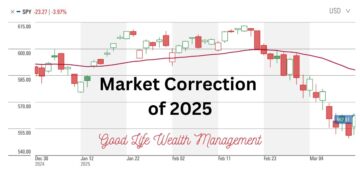So much attention is paid to picking “the right fund” or “the best fund” by investors, but in my experience, this question has little bearing on whether or not an investor is successful in achieving their goals. In fact, I don’t even think fund selection is in the top 5 factors for financial success. There are so many more important things to consider first!
1) How much you save. If you contribute $500 a month to your company 401(k) and your colleague contributes $1,000 a month, I would bet that they will have twice as much money as you after 10 years, regardless of your fund selection process. Hot funds turn cold, so most investors just average out over time. Figuring out how to save and invest more each month will get you to the goal line faster than spending your hours trying to find a better fund.
2) Sticking with the plan. Your behavior can have a greater impact than your fund selection. Many investors sold in 2009, incurring heavy losses and then missing out on the rebound in the second half of the year. Trying to time the market is so difficult that investors are better served by staying the course rather than trying to get in and out of the market.
I know that people think they are being rational about their investments, but what usually happens is that we form an opinion emotionally and then find evidence which corroborates our point of view. This is called confirmation bias. Better to remain humble and recognize that we don’t have the ability to determine what the future holds. Buy and Hold works, but only when we don’t screw it up!
3) Starting with an Asset Allocation. People may spend a vast amount of time picking a US large cap fund, but then miss out on the benefits of diversification. Other categories may outperform US large cap stocks. I recently opened an account for a new client, whose previous advisor had him invested in 180 positions – all of which were US large cap and investment grade bonds. No small cap, no international equities, no emerging markets, no floating rate bonds, no municipal bonds, etc.
The most important determinant of your portfolio return is the overall asset allocation, not which fund you chose! Our process begins with you, your goals, timeline, and risk tolerance to first determine a financial plan, including an appropriate asset allocation. The asset allocation is really the portfolio and then the last step is to just plug in funds to each category. Funds in each category perform similarly. If it’s a horrible year, like 2008, in US large cap, that fact is more significant than which large cap fund you chose.
A famous, and controversial, 1995 Study found that 95% of the variability of returns between pension funds was explained by their asset allocation.
4) Not chasing performance. The problem with trying to pick the best fund is that you are always looking through today’s rearview mirror. There will always be one fund that has the best 5, 10, or 15 year returns. There are always funds which are doing better than your fund this year. But if you buy that new fund, you may quickly become disappointed when the subsequent returns fail to match its “perfect” track record.
So then you switch to another new fund. And like a financial Don Juan, the performance chaser is quick to fall in love, but just as quick to move on, creating a tragic, endless cycle of hope and failure. If you are investing for the next 30 years, changing funds 30 times does not improve your chances of success! By the way, if you exclude sector funds, single country funds, and other niche categories from your portfolio, you will be well on your way to avoiding this pitfall.
5) Setting Goals. If you have a goal or large project at work, you probably create a plan which breaks that goals down into a series of smaller steps and objectives. Unfortunately, very few people apply the same kind of discipline, planning, and deliberate process to their finances as they do to their career and other goals. When you begin with the goal in mind, your next steps – how much to save, how to invest, what to do – become clear.
Bonus, 6) Doing what works. Why reinvent the wheel or take on unnecessary risk? We know that 80% or more of actively managed funds lag their benchmarks over five years and longer. With 4 to 1 odds against you choosing a fund that outperforms, why take that risk at all? Even if you get it right once, do you realize how small the possibility is that your choice will outperform for another five years? Better to stick with Index Funds and ETFs. Besides the better chance of performing well, you will also start with very low expenses and excellent tax efficiency. When you use Index funds, it frees up your mind, time, and energy to focus instead on numbers 1-5.
Choose your funds carefully and deliberately because you should plan to live with those funds for many, many years. There are genuinely good reasons for changing investments sometimes and we won’t hesitate to make those trades when necessary. But on the whole, investors trade way too much for their own good. The grass is not always greener in another fund!







